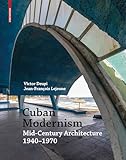Cuban Modernism : Mid-Century Architecture 1940–1970 / Jean-Francois Lejeune, Victor Deupi.
Material type: TextPublisher: Basel : Birkhäuser, [2021]Copyright date: ©2021Description: 1 online resource (344 p.)Content type:
TextPublisher: Basel : Birkhäuser, [2021]Copyright date: ©2021Description: 1 online resource (344 p.)Content type: - 9783035616415
- 9783035616446
- Architektur
- Architekturfotografie
- Avantgarde
- Beton
- Havanna
- Inselparadies
- Kolonial
- Kolonialstadt
- Kolonialstil
- Kuba
- Moderne
- Modernes Bauen
- Revolution
- Stadtplanung
- Trinidad
- architektonische Moderne
- karibischer Lifestyle
- kolonialer Glanz
- kubanische Architektur
- kubanischer Stil
- ARCHITECTURE / Regional
- Cuba
- Modern Architecture
- Urban Planning
- online - DeGruyter
- Issued also in print.
| Item type | Current library | Call number | URL | Status | Notes | Barcode | |
|---|---|---|---|---|---|---|---|
 eBook
eBook
|
Biblioteca "Angelicum" Pont. Univ. S.Tommaso d'Aquino Nuvola online | online - DeGruyter (Browse shelf(Opens below)) | Online access | Not for loan (Accesso limitato) | Accesso per gli utenti autorizzati / Access for authorized users | (dgr)9783035616446 |
Frontmatter -- CONTENTS -- PREFACE -- INTRODUCTION – Modernity and Cubanidad -- CHAPTER 1 – The Modern Cuban House -- CHAPTER 2 – The City as Landscape: Forestier, Sert, and the Planning of Havana -- CHAPTER 3 – The Modern City: Housing, Civic Infrastructure, and Representation -- CHAPTER 4 – Tropicality, Tourism, and Leisure -- CHAPTER 5 – The Synthesis of the Arts -- CHAPTER 6 – Exile and Heritage -- BIOGRAPHIES -- SELECTED BIBLIOGRAPHY -- INDEX -- ILLUSTRATION CREDITS -- ABOUT THE AUTHORS
restricted access online access with authorization star
http://purl.org/coar/access_right/c_16ec
In the 20th century, modern architecture thrived in Cuba and a wealth of buildings was realized prior to the revolution 1959 and in its wake. The designs comprise luxurious nightclubs and stylish hotels, sports facilities, elegant private homes and apartment complexes. Drawing on the vernacular, their architects defined a way to be modern and Cuban at the same time – creating an architecture oscillating between tradition and avantgarde.Audacious concrete shells, curving ramps, elegant brises-soleils and a fluidity of interior and exterior spaces are characteristic of an airy, often colorful architecture well-suited to life in the tropics. New photographs and drawings were specially prepared for this publication. A biographical survey portraits the 40 most important Cuban architects of the era.
Vor der Revolution 1959 und in den Jahrzehnten danach ist in Kuba eine aufregende und eigenständige Architektur entstanden. Dieser erste umfassende Überblick zeigt luxuriöse Nachtclubs und Hotels, Sportanlagen, elegante Privathäuser und Apartmentgebäude. Geschickt verknüpften die kubanischen Architekten althergebrachte Bauweisen mit der Moderne und schufen eine Architektur zwischen Tradition und Avantgarde.Gewagte Betonschalen, geschwungene Rampen, elegante Brises-Soleils und fließende Übergänge zwischen Innen- und Außenraum sind charakteristisch für eine luftige, oft farbenfrohe Architektur, die an die tropische Umgebung angepasst ist. Für die Publikation wurden Bauten neu fotografiert und Pläne neu gezeichnet. Ein biographischer Überblick porträtiert die 40 wichtigsten kubanischen Architekten dieser Epoche.
Issued also in print.
Mode of access: Internet via World Wide Web.
In English.
Description based on online resource; title from PDF title page (publisher's Web site, viewed 01. Dez 2022)


